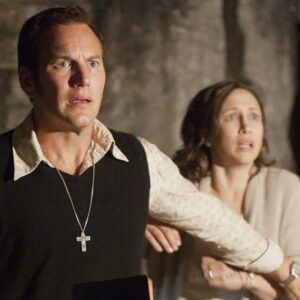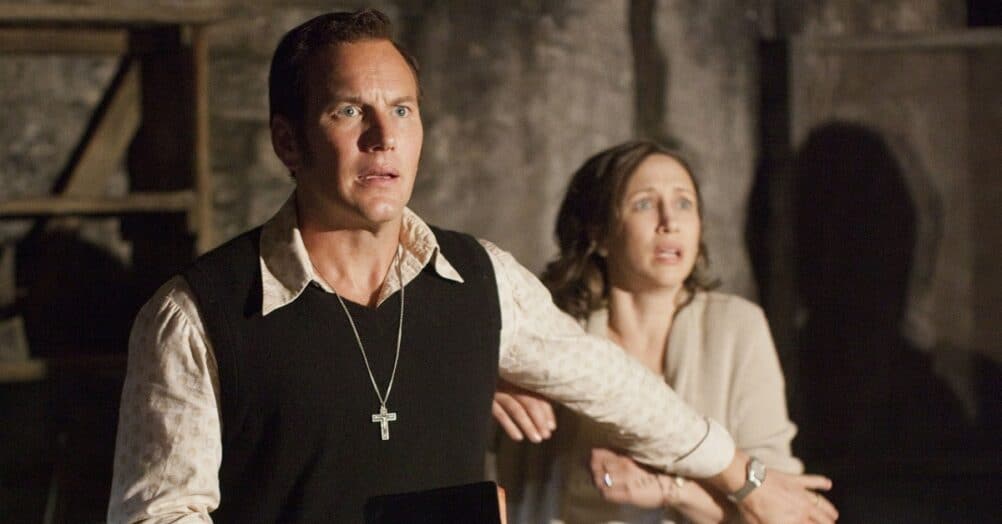Last Updated on August 2, 2021

PLOT: An unhappily bereaving mother in war-torn Tehran must protect her young daughter from a deleterious Djinn that has infiltrated their home.
REVIEW: Featured two months ago on our list of Most Anticipated Genre Flicks to see this autumn, all I really knew about UNDER THE SHADOW, aside from boasting one of the best horror titles in some time, was that it had been garnering unanimously positive festival buzz in prior months. And frankly, having just seen it, I'd have to wholeheartedly concur. In his first feature made after a skein of shorts, writer/director Babak Anvari has crafted a empathetically human, fitly efficient and genuinely unnerving PG-13 horror-show that not only works on the surface level of mere entertainment, but one that also argues quite subtly and effectively the psychological toll of ongoing wartime. With two incredibly sold performances by its two female leads – Narges Rashidi and Avin Manshadi – we can't urge you all enough to loom UNDER THE SHADOW when it enters theaters this very day, October 7th. Straight up, this is an anxiously ambient, slow-roasting maelstrom of madness!

The picture opens with a visit of our heroine, Shideh (Rashidi), to the university she used to attend. When soliciting a return to school to finish her studies as a doctor – this after the absence of a politically active, antiwar protest – she is flat out denied. Worse yet, her mother died six months prior. Bereaving and grief stricken, she returns home to the comfort of her young daughter Dorsa (Manshadi) and husband Iraj (Bobby Naderi). The next day Iraj is drafted as a medic to the frontline of the war between Iran and Iraq. He implores Shideh to take Dorsa to his parents house, outside of Tehran, but Shideh refuses on the logic that their daughter needs her home more than anything, and there's no reason to uproot her based on fear-mongering rumors. Such as, a missile is on its way into the city. Hunkering down, we get an empathetic glimpse at everyday life for the girls and how it doesn't drastically differ from anywhere else in the world. They play tea-time, watch TV, Shideh constantly exercises to classic Jane Fonda workout videos, reminding us we're firmly entrenched in the 80s. As we'll see, what goes around comes around!
Then one day, a missile does bombard their homestead. And as soon as it does, eerie and even supernatural occurrences begin happening around the house. As most neighbors begin to flee the city for safe haven, Shideh vows to stay put, promising to find Dorsa's missing doll Kimia before the pack up and get the hell out of dodge their damn selves. Dorsa won't leave without it. But the doll is gone, nowhere to be found. Dorsa develops a nasty fever with each passing hour. A giant ceiling crack left in the wake of the missile appears as some kind of conduit to the other side. A malefic Djinn is said to have crept in. It's here that the movies seems to suggest, in my interpretation, that collateral damage incurred by indiscriminant bombing will inevitably foment and proliferate pure evil. Blowback. As a brilliant allegory, Anvari seems to posit that, the bombing of innocent people in the wrong place at the wrong time is precisely the cause of retaliatory evil in the middle east. Here it's filtered through the lens of a haunted house yarn, but the subtle sentiment is not lost. In fact, the point is reinforced by the recurrence of Jane Fonda – a staunch antiwar activist during the 70s – which supports this entire notion that, no matter how good the intent of bombing might be, it will ineluctably spawn further hatred, which will in turn beget actionable retribution.
One of the inarguable strengths of the film is the technical shift from first half to second. In the beginning, the movie shot statically and quite sedately, lulling us in and keeping us put. When the bomb hits and the anxiety-ridden horror follows suit, the camera becomes far shakier, far more rambling and chaotic than the first half. What this does is create a genuine sense of coiling nerves, deceptively so, until a knot of tension grips the pit of your stomach in the final 15 minutes or so. Speaking of time, another plaudit to the picture is its efficiency. There's no unneeded fat or wasted time, every scene feels focused in a way that organically leads to the next. A small movie, yes, but expertly executed, properly paced, and when needed, flashes some serious fangs. Most importantly though, again in terms of timeliness, is the movie's subtly veiled message.

Mention must also be made of the performances in the movie, the two females in particular. First off, it's great to see such an example of female empowerment in a country like Iran (though the movie was shot in Jordan), a place where such is not often the case. Secondly, the ability for Narges Rashidi, a beautifully radiant woman who's face we can actually see, to warrant our empathy without being terribly likeable is a testament to her acting. We often root for likeable characters in movies and lend sympathy to them as such. Well, here, due to understandable circumstances – losing her mom, her schooling, her husband – Shideh doesn't come off as all that pleasant. Still, we can relate to her, precisely because of the way her daily life is depicted. Her struggles do not differ from our own, which is plenty good enough from an Iranian movie to allow us to see the world through her eyes, and feel for her accordingly. Additionally, for novice like Avin Manshadi to lend this believable a performance in her very first acting credit, it's a true sight to behold. Kids are often so damn annoying in movies, horror ones in specific, yet here is a little girl giving no indication whatsoever. The acting is as impressive as both the horrific finale and the movie's underlying thesis.
If you couldn't tell, yes, we aggressively urge you all to check out UNDER THE SHADOW when it comes to a theater near you this weekend. It's an efficiently lean, well acted and brilliantly directed piece of horror cinema. Better yet, it actually has something to say about the world we live, universal truths that remain so whether now, today, or even back decades, and how we should still fear such in the future. And it does so all under the guise of a tension-mounting, authentically unsettling haunt. See this movie!





















Follow the JOBLO MOVIE NETWORK
Follow us on YOUTUBE
Follow ARROW IN THE HEAD
Follow AITH on YOUTUBE